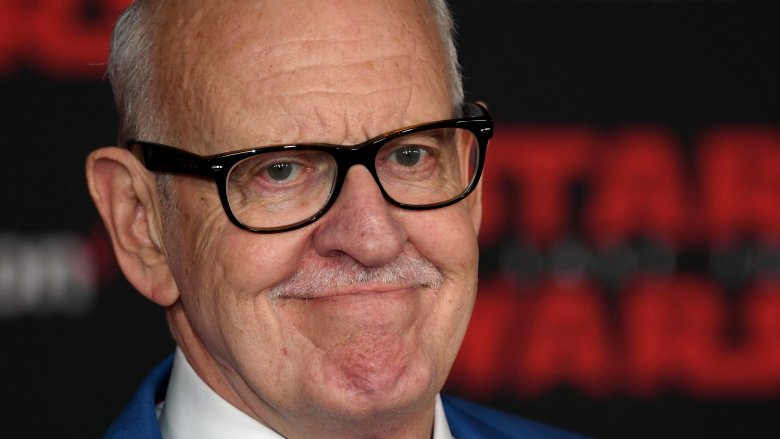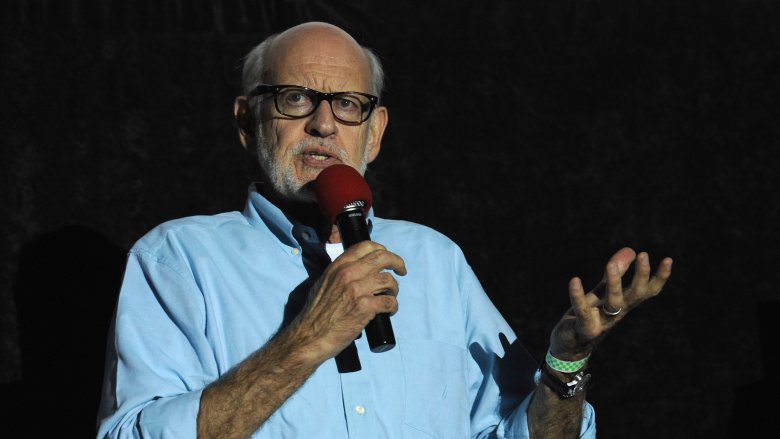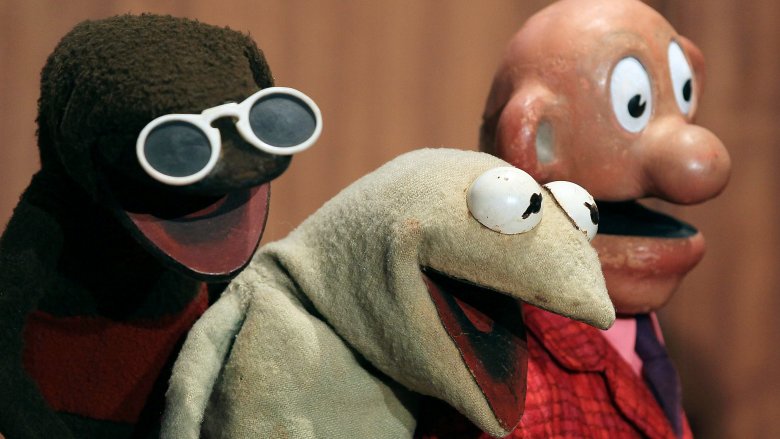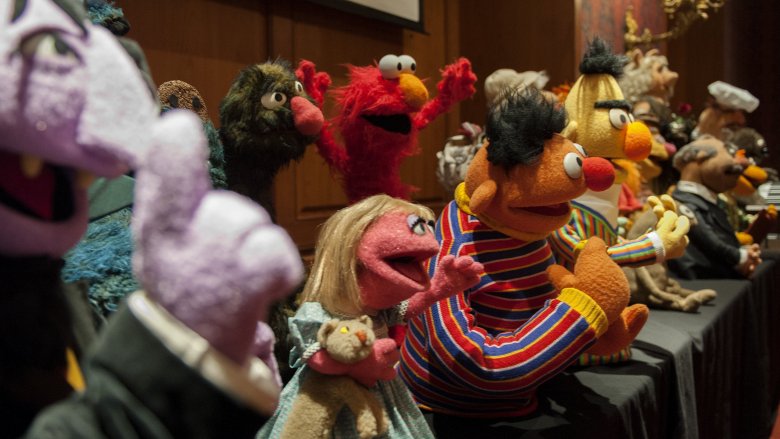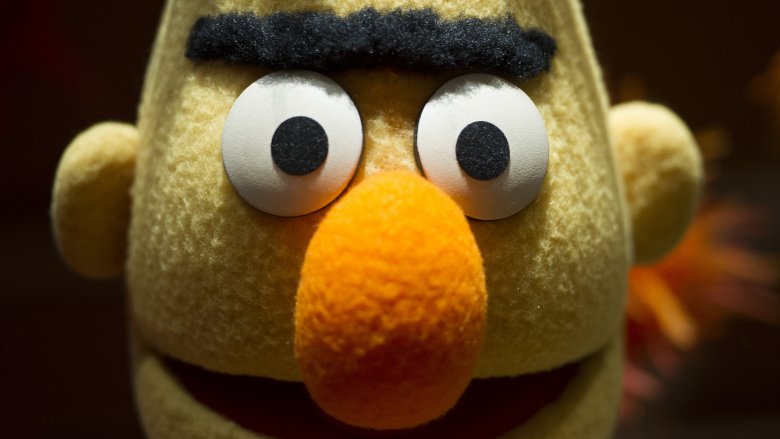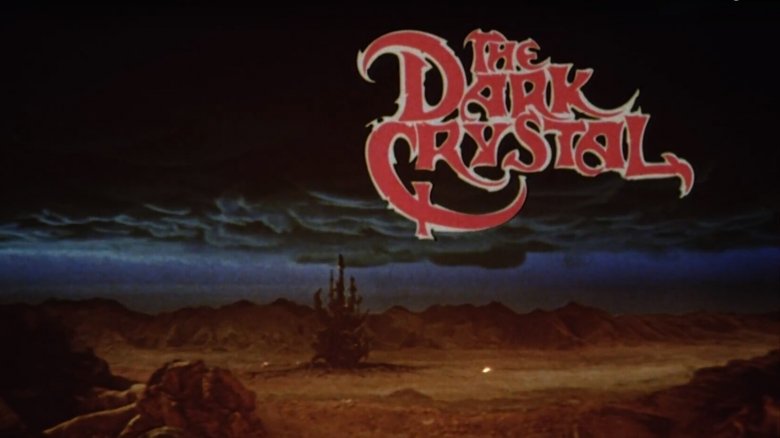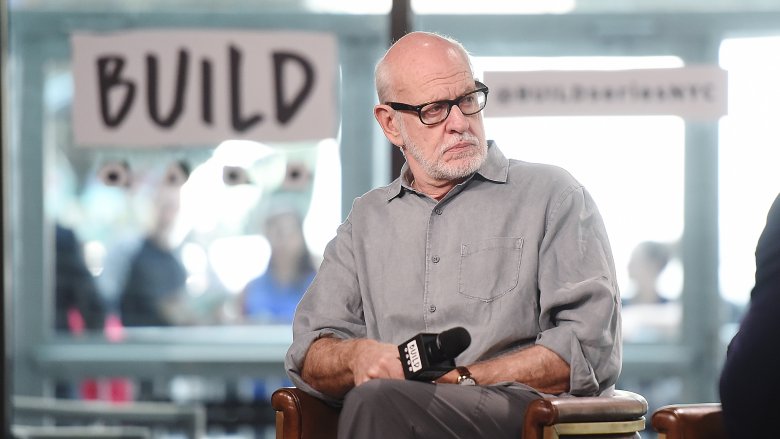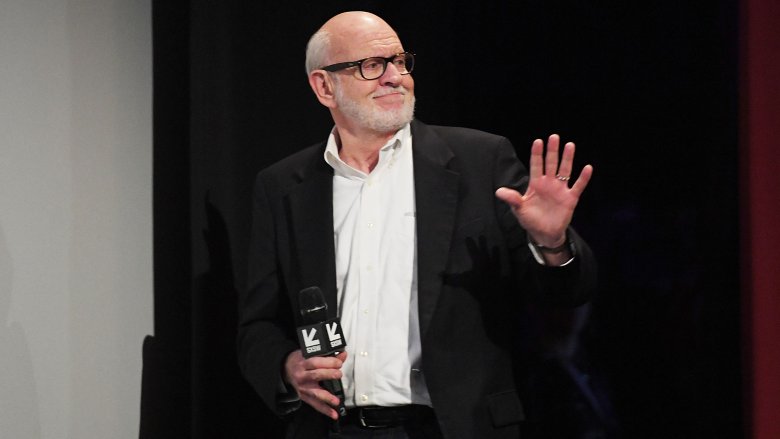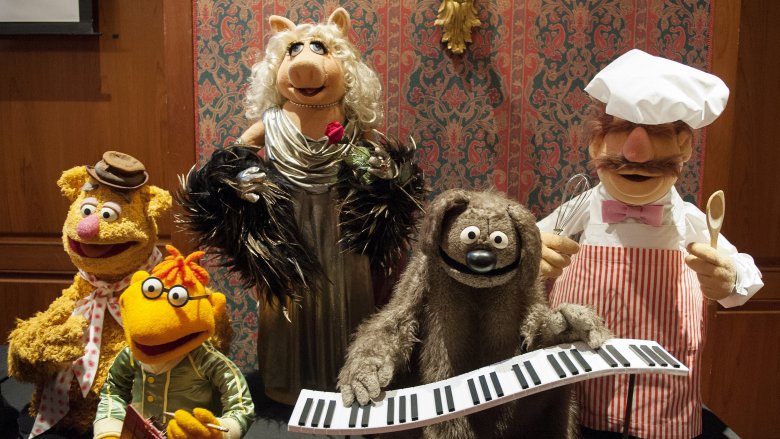The Untold Truth Of Frank Oz
Everyone knows Frank Oz, even if they don't know his face. For four decades, he brought many of the most beloved Muppet characters to life. He's been an integral part of all three Star Wars trilogies, shepherding Yoda from puppet to CG creation and back again. He's even lent his voice to Pixar characters. As if his many iconic performances weren't enough, he's also directed a dozen feature films in a myriad of genres, from musicals to heist dramas.
Oz recently released Muppet Guys Talking, a documentary available exclusively from his own website. It captures a conversation he had with fellow Muppet performers Dave Goelz, Fran Brill, Bill Barretta, and the late Jerry Nelson. Their memories, blended with archival behind-the-scenes footage, reveal the spirit of creativity nurtured by Jim Henson. But these collaborations are only part of the Frank Oz story. We've got more of the stories you might not know about the man behind the Muppets, the movies, and the magic.
He was born into puppetry
Frank Oznowicz was born in 1944, the son of Frances and Isidore Oznowicz, who were both puppeteers. In fact, Isidore would later serve as president of the Puppeteers of America, in addition to working as a window trimmer. After Isidore returned from fighting in World War II, the family relocated from Hereford, England, to Frances' home country of Belgium when Frank was just six months old. Five years later, they would move again, this time to America.
Frank didn't actually share his family's professional interest in puppetry, at least not initially. He picked up the art to please his parents, to make some money, and to overcome his own shyness. As he later revealed in an interview with IGN, he planned to study journalism, but spent his teenage years working as apprentice puppeteer at the Children's Fairyland amusement park in Oakland, California. At age 17, Frank attended a Puppeteers of America convention for the first time, and that's where he met Jim Henson.
He stepped in for Jane Henson
Frank Oz was one of the very first people to join the Jim Henson Company — in 1963, at just 19 years old. Before that time, Henson's primary collaborator was his wife, Jane. The couple co-created the show Sam and Friends for local broadcast in Washington, D. C. in the 1950s. This series would lay the groundwork for what would become the Muppets, featuring technical innovations in puppetry and even the first appearance of Kermit the Frog (though he began as a lizard).
With a crew of only four puppet designers and performers (which also included builder Bob Payne and writer Jerry Juhl, who would both be involved with the Muppets for decades to come), Jane was responsible for much of the content of Sam and Friends. She even ran the show for a year without Jim while he traveled Europe studying international puppetry. But when the Hensons settled into a family life, Jane became less involved in the business.
As the '60s began, the Hensons relocated to New York City and were expanding from local-access television into national commercials and variety show appearances. With their third child on the way, fresh help was needed to take Jane's place. That's when Jim remembered the promising teenager he had met at the Puppeteers of America convention. With some training from Jane, Frank Oz came on board, and a new creative partnership was born.
He never performed for children
"I'm going to ask you a question," Frank Oz said during an interview at the SXSW premiere of Muppet Guys Talking. "What is a children's film versus an adult's film? I maintain that kids can handle more than people think." It's a philosophy that dates back to Jim Henson's earliest work.
Though the Muppets reached new heights of fame with the arrival of Sesame Street in 1969, the performers always resisted being labeled as children's entertainers. Bringing The Muppet Show to prime time was an effort to shake that perception. In fact, one of the two pilots for the series was titled "Sex and Violence."
Henson and his troupe would continue to stretch the perception of an age limit on their audience. Muppet Show guests included figures as sophisticated as Rudolf Nureyev and as potentially controversial as Alice Cooper. In the 1980s, they would turn their efforts to more sober projects like The Storyteller, The Jim Henson Hour, and The Dark Crystal. "We were adults and we had fun performing as adults," Oz reflected on Twitter, "and the kids got it."
He has deep backstories for his characters
One reason for the Muppets' adult appeal is that the performers often had complex psychological profiles for their characters. For Frank Oz, humor often came from very serious pain or anxiety. With the release of Muppet Guys Talking, he has at last revealed some of the life stories behind fan favorite characters. "I have to take it seriously," he explained while promoting the documentary, "because if it was funny, it wouldn't be funny."
According to Oz, Miss Piggy was raised on a farm, but left home after her father died in a tractor accident and her bevy of suitors caused tension with her mother. Grover is driven by a desire to please everyone around him, to the point that even his speech patterns are affected. He went on to detail that he thinks of Fozzie as the only one who doesn't have a key to the Muppet Theater. And he sums up Animal very succinctly with the words, "Drums, sleep, food, sex, and pain."
He influenced Yoda's character
Rivaling his Muppet Show and Sesame Street characters for pop culture status is Yoda, one of the most iconic elements of Star Wars since Oz first brought him to life in 1980. According to Oz in an A.V. Club interview, George Lucas and Empire Strikes Back screenwriter Lawrence Kasdan scripted some of the Jedi Master's "backwards language," but he was the one who suggested making the verbal eccentricity a more prominent feature. Oz worked to bring out the "tremendous gravitas" he saw in Yoda, and balance it with the character's willingness to laugh.
When a slightly younger Yoda appeared for Lucas' prequel trilogy, many fans took issue with the character's transition from a puppet to a CG creation. But Oz, who returned to lend his voice, was supportive of the update, understanding that the story's action required the greater physical freedom of animation. "I don't care about the puppet-craft, I care about what works," he explained in the aforementioned interview. "It's about compelling an audience."
Oz was equally understanding when writer/director Rian Johnson asked him to bring Yoda back to the realm of puppetry for The Last Jedi. Since the story called for Yoda to appear as a "Force ghost" to Luke Skywalker, the old-school effect was not just fan service, but a matter of continuity. "You couldn't have CGI Yoda with Luke, because Luke wouldn't know a CGI Yoda," he reasons. "The only Yoda Luke knew was a puppet character."
Jim Henson nudged him into directing
When Jim Henson asked Frank Oz to co-direct 1982's The Dark Crystal with him, Oz was confused. Having never directed anything, Oz asked Henson why he was making this offer. As he would later recall in an IGN interview, Henson's answer was simply, "Because it would be better." Though Oz cites his role in the production as merely an assistant to Henson, it was the first step in his new career as a filmmaker.
Oz took on solo directing duties for the third Muppet feature film, The Muppets Take Manhattan, in 1984. His next project, Little Shop of Horrors, saw him step away from the Henson fold while still utilizing his extensive puppet expertise. In the decades that followed, he branched out as a director into a wide variety of genres, from the comedy of Dirty Rotten Scoundrels to the family fantasy of The Indian in the Cupboard and the heist drama of The Score.
He's honest about creative tension
Because of that variety of projects, Oz's career has presented him with a number of challenges. Several of his films have faced on-set tensions, post-production snags, or divisive critical reception. Where many filmmakers might blame studio interference or refuse to address controversy, Oz has a history of honesty about what went wrong and how he could have better managed these situations.
Oz is quick to accept responsibility for the infamous Little Shop of Horrors ending reshoots, citing the experience as a lesson in audience expectations. He had a notoriously difficult time working with Marlon Brando on The Score, with Brando mostly refusing to take direction and co-star Robert De Niro essentially acting as a go-between. Oz would later reflect, "Marlon was trying to make more of a statement in his acting, and I wouldn't let him, and I was very tough — I should have been more nurturing." His greatest critical failure was a 2004 remake of The Stepford Wives, which he would chalk up to his own lack of vision for the project.
He almost directed another Muppet movie
The path of the Jim Henson Company after its founder's death has been a long and winding one. Henson, losing interest in the business side of show business in the late 1980s, was negotiating a sale of the company to Disney that would have allowed him funding and freedom to pursue his creative ambitions. His sudden death in 1990 caused the negotiations to fall through, leaving only a smattering of Muppet/Disney collaborations throughout the decade, including The Muppet Christmas Carol, Muppet Treasure Island, and the theme park attraction Muppet Vision 3D.
Disney's interest in owning the Muppets returned, however, and in 2004, their purchase of the characters finally occurred. Chairman Dick Cook, searching for a project to mark the grand return of the beloved characters, discovered an un-produced pitch that originated decades earlier with Jerry Juhl, Jim Henson, and Frank Oz titled The Cheapest Muppet Movie Ever Made. The concept was that Gonzo had taken on the role of director and blown his budget on spectacular opening titles, requiring the Muppets to make their next movie a hilariously shoestring production.
Oz revealed in a Reddit AMA that Cook approached him to direct the film. With the help of writer Jim Lewis, he updated and rewrote the decades-old Cheapest Muppet Movie script. "And personally, I love it," he reflected. "I wish it could be made, but maybe its time now is gone because it feels like Disney would like to go their own way." Disney ended up passing on the project in favor of Jason Segel's script that would become 2011's The Muppets, without any involvement from Oz.
He avoided social media for years
One way in which the release of Muppet Guys Talking has already changed Frank Oz's life is in the way he has chosen to promote it. As of 2017, Oz was the rare famous creator who still had no official social media presence. But when The Last Jedi premiered in December, he appeared on Twitter with the handle @TheFrankOzJam. The account was eventually verified, and Oz confirmed he had joined the platform at last.
He later explained in an interview with Boing Boing that he was finally taking the social media plunge after years of avoiding it in an effort to promote the documentary. However, he quickly discovered how much he enjoyed connecting with fans. "I think the reactions on Twitter are the most fun for me," he said. "They give me information I don't know, or correct me, or thank me." His wife and Muppet Guys Talking producer Victoria Labalme went on, "The internet is a place where most everyone can have access and be included. Because of the spirit of the Muppets, we wanted to reach everyone."
He misses the Muppets
Frank Oz hasn't been directly involved with the Muppets for years. After the release of Sony's Muppets From Space, Oz handed off most of his characters to performer Eric Jacobson in 2000, making only sporadic appearances on Sesame Street in the following years. He reflected on this transition in an interview with Yahoo! Entertainment, explaining that his directorial duties and family life required him to step away from the rigorous schedule of performing the menagerie he had helped create. "I had to release them," he explained. "And it hurt, because I still love 'em so much."
Oz has occasionally been critical of Disney's handling of the Muppet brand in recent years, expressing dissatisfaction with the 2011 revival film's script and accusing the short-lived ABC sitcom The Muppets of not trusting the performers. He clarified in the Yahoo! interview that he believes the company is doing their best, but they don't understand that "what's really strong about the Muppets is the people underneath the characters." When asked by Collider if he would ever return to the troupe, he simply reasoned, "That's up to Disney."
